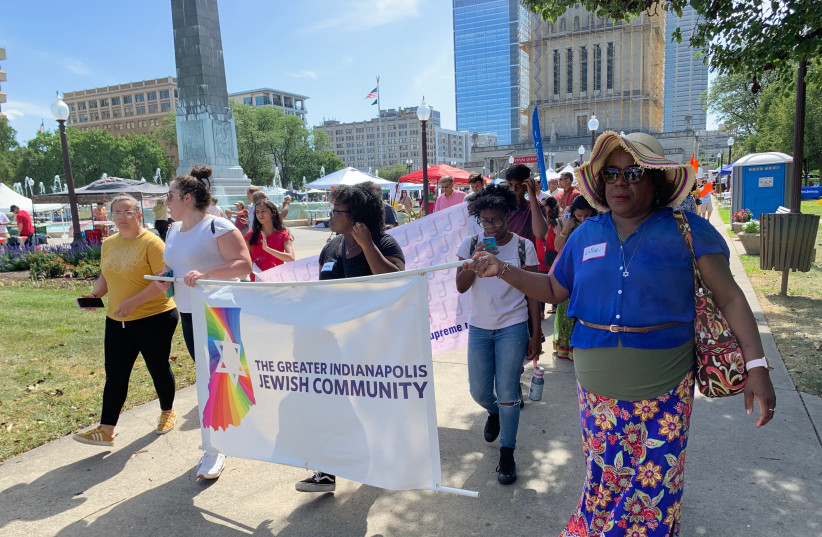During the days between Rosh Hashanah and Yom Kippur, I found myself feeling trepidation. These are the majestic Days of Awe, a time of reflection, renewal and atonement for sins. But beyond being anxious to merit divine mercy, I had an even more basic worry – if, as a Jew of color, I will even be able to get in the door to pray.
No question, the High Holy Days are a time of heightened security at synagogues across the land, as threats against Jewish institutions continue to multiply. Yet, while I pose no danger to anyone, synagogue staff, security guards and even other members all too often view me as an outsider at best and as a potential threat at worst. I’ve been halted and asked for my identification when white Jews are let right into the building.
I’ve been directed to the kitchen rather than the sanctuary. I’ve been turned away at the outer gate, as if I’m a door-to-door salesman. I’ve been asked if I’m from a newspaper, as if the only reason I would be participating in the service is because I’m writing about it.
The Jewish community is becoming more diverse by the day. Seventeen percent of American-Jewish adults live in a household where at least one person (adult or child) is Hispanic, black, Asian, another race or multiracial. The younger Jews are, the less likely they are to have descended from the white Eastern European Jews who came here more than a century ago.
If we are to truly take stock of our individual and collective failings this year, then we need to look at the ways in which we have allowed racism to shape the ways in which Jews of color like me are viewed. Let’s put a stop to all those “Funny, you don’t look Jewish” back-handed compliments, which are, quite frankly, offensive to non-white Jews. Just because of my skin color, it’s often assumed that I don’t know where to go in the synagogue, what to say, how to act or even what holiday it is.

It’s no wonder four-fifths of Jews of color report feeling discriminated against in Jewish settings.
What can and should be done?
Making synagogues more welcoming and inclusive poses particular challenges these days, given the heightened threat environment mentioned above. My own organization, the Jewish Federations of North America (JFNA), has raised tens of millions of dollars in grants as part of an initiative called LiveSecure to enable Jewish communities to develop comprehensive plans to protect all their institutions. We are doing so in partnership with Secure Community Network (SCN), the official safety and security organization for the Jewish community in North America.
SCN now incorporates a proactive, anti-bias component in their training for synagogues. The helpful guide “The Power of Hello” needs to be widely adopted throughout the Jewish communal world; it educates staff to assess potentially suspicious behavior, rather than dwelling on surface characteristics. These include encouraging greeters and ushers to be observant of people and situations and to consider whether or not someone needs help rather than posing a threat.
Minority group members have frequently been traumatized by their past interactions with law enforcement, so the very presence of armed uniformed officers can be anxiety-inducing. As a Jewish community, we have to acknowledge the fact that intergenerational trauma exists among all of our community members and we must seek out innovative ways to foster a sense of belonging for all Jews and their loved ones.
For example, taking the time to brief security personnel about the diversity or potential diversity of the community can go a long way in reducing the potential for discrimination. Synagogues must take a multi-pronged approach to making their services more welcoming and inclusive, ensuring that those planning and leading the services are diverse.
Synagogue leadership should seek out guidance from community members most likely to be impacted by interactions with security personnel when developing culturally competent security protocols. They must develop a process for resolving diversity-related security complaints in a way that is humane and empathic. And they must be scrupulous about treating everyone with dignity and respect.
Nefesh, a synagogue in East Los Angeles led by Rabbi Susan Goldberg, has committed itself to “placing the margin at the center.” According to the congregation’s website, it welcomes “those who have struggled to find Jewish community and their authentic, valued place within it,” including women, Jews of color, queer and trans people, deaf Jews, interfaith families and others – all those, in fact, “who have felt excluded from or devalued within Jewish spaces.”
We all deserve to be able to express our Jewish identity without fear of being disenfranchised, especially during the Days of Awe, when we seek to transform ourselves, our relationships and the world in the image of the divine.
The writer is director of Community Safety and Belonging at the Jewish Federations of North America.
